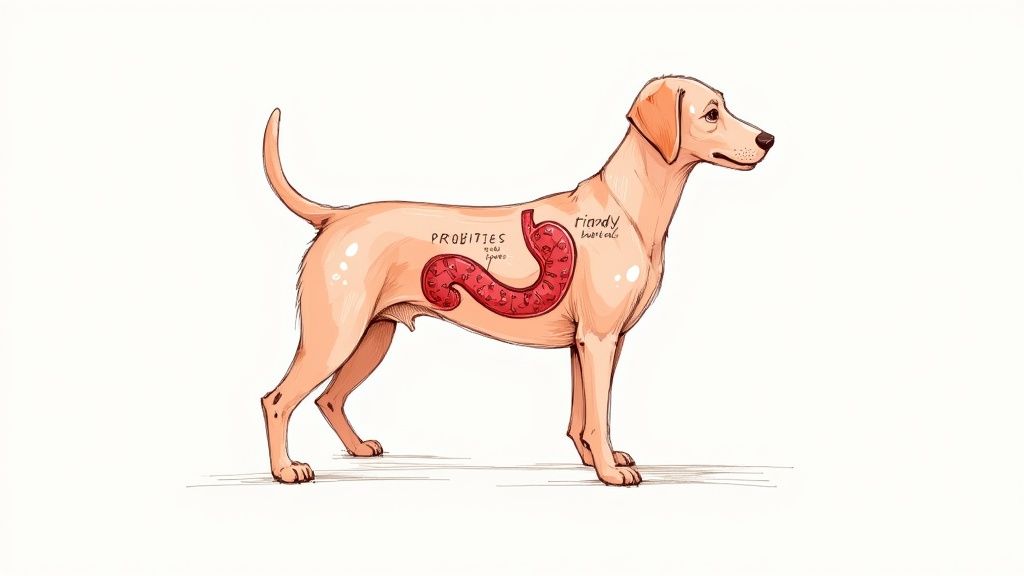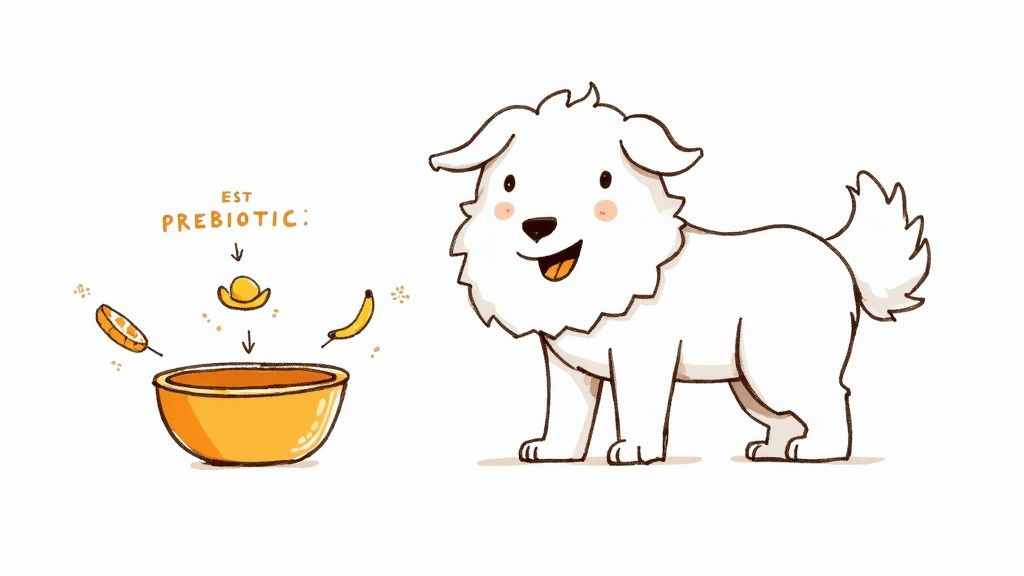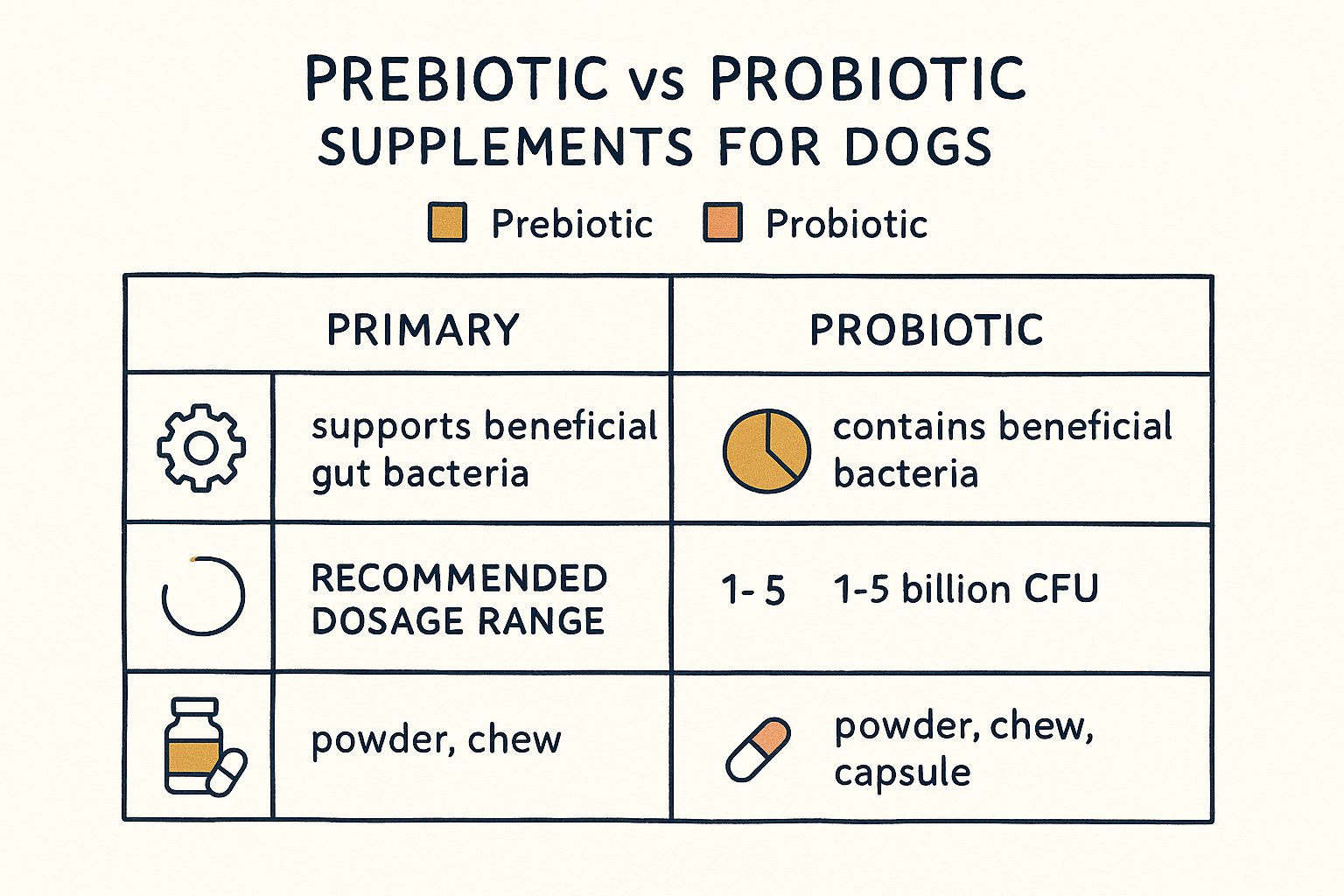When it comes to your dog's health, their gut is at the very centre of it all. You can think of probiotics as the 'good guys'—the live, friendly bacteria that help keep their digestive system balanced. Prebiotics, on the other hand, are the specialised fibres that act as a food source for these good bacteria, helping them thrive. They're a real power couple for canine wellness.
Your Dog's Gut: The Key to Overall Health

It’s easy to think of your dog's gut as just a food-processing plant, but it’s so much more than that. It's the bustling headquarters for their entire body, influencing everything from their energy and mood to their ability to fight off illness. Simply put, when their gut is happy, they are happy.
Let's use a simple analogy: imagine your dog's gut is a garden. For that garden to flourish, you need good seeds to plant and fertile soil for them to grow in. This is exactly how prebiotics and probiotics for dogs work. The probiotics are the beneficial bacteria—the 'seeds'—and the prebiotics are the specialised plant food that helps them take root and flourish.
Why Gut Health Matters So Much
That community of microorganisms living in your dog’s digestive tract—often called the gut microbiome—is absolutely crucial for their vitality. If things get out of balance, it can trigger a whole cascade of problems that go way beyond an occasional upset stomach.
In fact, many common health niggles in dogs can be traced right back to an unhappy gut.
- Digestive Woes: Things like excessive gas, bloating, diarrhoea, or constipation are often the most obvious red flags.
- A Weaker Immune System: A huge part of your dog's immune system is actually located in their gut. It’s their first line of defence against germs and illness.
- Skin and Coat Troubles: Chronic itching, rashes, and a dull, flaky coat are frequently linked to inflammation that starts in the gut. If this is a concern, we have a detailed guide on how to support your dog’s skin and coat health that you might find useful.
Vets and scientists are now calling a dog's gut their "second brain," and for good reason. It plays a massive role in managing inflammation and how the body copes with daily stressors, from diet changes to antibiotics.
This guide will break down exactly what these supplements are, why they're so important, and how they work together to keep your best friend feeling fantastic from the inside out.
What Are Probiotics? The Good Gut Guardians

Let's break down what probiotics actually are. Think of them as a team of tiny, live-in helpers working away inside your dog's gut. These are the probiotics—live, beneficial bacteria that are crucial for keeping their digestive system balanced and happy.
When this internal team is strong and thriving, it helps everything tick along nicely. These good gut guardians work by outnumbering and pushing out the harmful bacteria, stopping them from gaining a foothold and causing problems. This delicate balance is vital not just for digestion, but for your dog's overall health and energy levels.
The Key Players in Your Dog's Gut
Not all probiotics are the same, though. Different types, known as 'strains', have different specialities. It's a bit like building a sports team; you need players with a range of skills to cover all bases. The same logic applies to your dog’s gut health.
Two of the most well-studied and effective groups of probiotics for dogs are:
- Lactobacillus strains: These are the real workhorses. They produce lactic acid, which makes the gut environment less welcoming for bad bacteria and helps your dog absorb more nutrients from their food.
- Bifidobacterium strains: This group is essential for keeping the gut lining strong and healthy. They also play a big part in supporting a robust immune system.
A top-notch supplement containing prebiotics and probiotics for dogs should always include a good variety of these strains. A formula with multiple strains offers a much more comprehensive defence, as each one brings something unique to the table. It’s this diversity that builds a resilient, thriving gut environment that can cope with life's little challenges.
It's clear that dog owners are catching on. In the UK and Europe, dogs are the biggest consumers of pet probiotic supplements, making up a massive 65% to 78% of the market share. In fact, the dog probiotic sector is expected to more than double by 2035, all thanks to owners looking for more natural ways to care for their pets. You can dive deeper into the dog probiotic supplements market trends to see the data for yourself.
This shift really shows how many of us now realise just how deeply gut health affects our dogs' well-being.
Probiotics aren't just for digestion. They are fundamental to a healthy immune response, helping to manage inflammation and protect your dog from the inside out. A balanced gut is truly a dog’s first line of defence.
Ultimately, by giving your dog these beneficial microbes, you're actively strengthening their natural defences. It’s a simple, proactive way to invest in their long-term health and ensure their internal ecosystem is in the best possible shape to keep them happy and full of life.
Understanding Prebiotics: Fuel for the Good Guys

So, we've talked about the friendly army of probiotics living in your dog's gut. But what keeps that army well-fed and ready for action? That’s the job of prebiotics.
Prebiotics aren't live bacteria. They're actually a special kind of plant fibre that your dog can't digest in the usual way. Instead, these fibres make their way down to the colon untouched, where they become a gourmet meal for the beneficial bacteria living there.
This is a clever bit of biological teamwork. By feeding the good microbes, prebiotics help them to multiply and flourish, which in turn helps to crowd out the more harmful bacteria.
Let's go back to our garden analogy. If probiotics are the seeds you plant for a healthy gut, think of prebiotics as the specialised, high-quality fertiliser that helps them grow strong. Without that essential nourishment, the probiotic "seeds" would have a much harder time taking root and thriving.
Common and Effective Prebiotic Sources
You can find prebiotics in certain foods, but for a truly therapeutic effect, a concentrated, targeted supplement is often the best approach. The best prebiotics and probiotics for dogs will contain specific types of fibre that are scientifically recognised for their positive impact on the gut microbiome.
Two of the most effective and well-researched prebiotics for dogs are:
- Inulin: Typically sourced from chicory root, inulin is brilliant at feeding beneficial bacteria like Bifidobacterium and Lactobacillus, helping to keep the gut in balance.
- Fructooligosaccharides (FOS): These are short chains of fructose molecules found in plants like asparagus and Jerusalem artichokes. They function much like inulin, providing a targeted food source for good gut bacteria.
When a supplement includes these specific fibres, it helps create the perfect environment for your dog’s beneficial gut flora to thrive. This is absolutely fundamental to their overall digestive health and immune response.
The main job of a prebiotic is to selectively feed the good guys. By providing targeted nourishment only for beneficial gut bacteria, they become incredibly effective at rebalancing the entire gut ecosystem and boosting your dog’s health.
Ultimately, prebiotics are the unsung heroes of gut health. They make sure the probiotic "guardians" are numerous, strong, and well-fed enough to do their job properly. It’s this supportive role that is so crucial for maintaining a resilient digestive system and, of course, a happy, healthy dog.
Why Prebiotics and Probiotics Are a Power Couple for Your Dog's Gut
While prebiotics and probiotics each bring something valuable to the table, they create some real magic when they work together. Think of it like a perfectly synchronised duo. This powerful partnership is easily the most effective way to support your dog’s digestive health, particularly for pups with sensitive tummies or those bouncing back from being unwell.
Probiotics, the ‘good’ bacteria, are the main players, but they can’t do their job properly without a solid support crew. That's where prebiotics come in. They act as the backstage team, preparing the gut environment so the probiotics can not only survive the journey but thrive, multiply, and get down to business once they arrive.
The Synbiotic Super-Team
When you find a supplement that contains both prebiotics and probiotics for dogs, it's called a synbiotic. This clever combination means the live probiotic bacteria arrive in the gut with their own personal food supply, ready to start working straight away.
This two-pronged approach is especially brilliant for dogs dealing with health issues. A round of antibiotics, for instance, can be a bit of a wrecking ball for the gut’s delicate ecosystem, clearing out the good bacteria along with the bad. A synbiotic formula helps to bring in fresh troops of beneficial microbes while giving them the exact fuel they need to rebuild a strong, healthy gut community.
To help you see how they work, here's a quick look at their different roles and the forms they usually take.

As you can see, their functions are distinct, but their end goal is exactly the same: a happy, healthy gut for your dog. This dual-action strategy is becoming more and more popular with discerning pet owners across the UK for good reason.
To really nail down the differences and how they complement each other, this quick table breaks it all down.
Prebiotics vs Probiotics At a Glance
| Feature | Probiotics | Prebiotics | Combined Benefit (Synbiotics) |
|---|---|---|---|
| What They Are | Live beneficial bacteria | Specialised plant fibres (food for bacteria) | A formula containing both probiotics and prebiotics |
| Primary Role | Directly add 'good' bacteria to the gut | Nourish and feed existing good bacteria | Introduces and sustains a healthy gut microbiome |
| Example | Lactobacillus, Bifidobacterium | FOS (fructooligosaccharides), inulin, MOS | A supplement combining both |
| Analogy | Seeds for the garden | Fertiliser for the soil | Planting fertilised seeds for a thriving garden |
This side-by-side view makes it clear: while one plants the seeds, the other ensures the garden flourishes.
This integrated approach is quickly becoming the gold standard in canine wellness. The UK pet probiotics market is growing steadily, with products that bundle probiotics, prebiotics, and even digestive enzymes leading the charge. This trend, expanding at about 9% each year, shows a growing realisation among owners about what it truly takes to support their dog's digestion and immunity.
For dogs struggling with common complaints like itchy skin or frequent digestive upsets, a combined synbiotic strategy is often the turning point. If you’re searching for an all-in-one solution, our Allergy, Itch & Digestive Probiotics Bundles are specifically designed to provide this complete support. By looking after gut health from every angle, you’re giving your dog the best possible foundation for a comfortable and vibrant life.
How to Choose the Right Supplement for Your Dog
Walking down the pet aisle, it's easy to feel a bit lost. The sheer number of prebiotics and probiotics for dogs can be dizzying, with every brand claiming to be the best. So, how do you cut through the noise and make a choice that genuinely helps your dog? It all starts with learning to read the label like an expert.
First up, look for the potency. This is measured in Colony Forming Units (CFUs), which is simply a count of the live, active bacteria in each dose. There isn't a single magic number that fits every dog, but for general day-to-day gut support, a good target is somewhere between one to ten billion CFUs per serving.
Next, think about diversity. A supplement with several different bacterial strains is far more powerful than one with just a single type. Look for a mix of Lactobacillus and Bifidobacterium species. It’s a bit like building a well-rounded team for a project; each strain has a slightly different job, and together they create a much healthier and more balanced gut environment.
Decoding the Label: What to Look For
Once you've got the basics of CFUs and strain diversity down, a few other details can help you separate the truly great supplements from the mediocre ones. These are the things that show a brand is committed to your dog's long-term health, not just making a quick sale.
A key thing to look for is a guarantee of the CFU count at the time of expiry, not just when it was made. Live bacteria can die off over time, so this guarantee ensures the product is still effective when it reaches your dog’s bowl.
Here's a quick checklist to keep in your back pocket:
- Synbiotic Formula: The best supplements contain both probiotics (the good bacteria) and prebiotics (the food for that bacteria, like FOS or inulin). This powerful combination gives the probiotics the fuel they need to get to work and flourish.
- Manufacturing Standards: Only buy products made in facilities that follow Good Manufacturing Practices (GMP). This is a seal of quality, showing a commitment to safety and consistency in every batch.
- No Nasty Fillers: Scan the ingredients list for artificial colours, flavours, or preservatives. A top-tier supplement focuses purely on high-quality, effective ingredients that actually support your dog’s health.
Remember, the goal is to choose a supplement based on scientific evidence and quality, not just clever marketing. A brand you can trust will be open and honest about how its products are formulated and made.
Choosing the Best Form for Your Dog
Supplements generally come as powders, chews, or liquids. The "best" one really comes down to what works for you and your dog. Powders are fantastic because you can mix them straight into your dog's food, making them an easy win for even the fussiest of eaters. Chews, on the other hand, often feel like a treat, so most dogs will gobble them up without a fuss.
The demand for these products is growing fast. The UK's pet probiotics market is set to expand at an annual rate of 7.5% from 2025. While local pet shops still account for 58% of sales, online retailers and subscription services are quickly gaining ground, giving owners more convenient ways to access high-quality options. You can discover more insights into the UK pet supplements market and see just how big this trend has become.
At the end of the day, the most effective supplement is the one you can give your dog consistently. By checking for CFUs, a good mix of strains, and quality manufacturing, you can feel confident you're choosing a product that will make a real, positive difference to their well-being.
A Probiotic Solution You Can Trust
It's one thing to understand the science behind prebiotics and probiotics for dogs, but it’s another thing entirely to find a supplement that actually puts that science into practice. Now that you know what to look for—from CFU counts to the right blend of strains—let's look at what a truly high-quality formula looks like in the real world. A great supplement should be transparent about what's inside, potent enough to work, and thoughtfully put together.
This is exactly where Tipaw's approach comes in. We’ve designed a supplement that isn't just ticking the boxes; it’s built from the ground up based on what a dog's gut truly needs. It's a complete synbiotic formula, meaning it delivers not only a powerful blend of beneficial bacteria but also the prebiotic fuel they need to thrive and restore balance to your dog's gut microbiome.
What Makes This Formula Different
Our formula is meticulously crafted with a multi-strain blend of probiotics, featuring key players from the well-researched Lactobacillus and Bifidobacterium families. This variety ensures a broad spectrum of support, as each strain has a slightly different job to do, from promoting healthy digestion to strengthening your dog's natural defences. We also guarantee the potency at the time of expiry, giving you peace of mind that your dog is getting the active, living bacteria they need in every single dose.
But we didn’t stop there. The formula also includes:
- Inulin: A scientifically-backed prebiotic fibre that acts as a targeted food source for the good bacteria, helping them to colonise the gut and flourish.
- Digestive Enzymes: These are essential helpers that support the breakdown of fats, proteins, and carbohydrates. This ensures your dog can absorb the maximum nutrition from their food while easing the overall load on their digestive system.
The real magic isn't just in the individual ingredients, but in how they work in synergy. This powerful combination supports better digestion, a more resilient immune system, and a noticeable improvement in your dog’s overall vitality and comfort.
This all-in-one approach means you can provide comprehensive gut support with one simple, effective product. Whether your dog suffers from the occasional tummy upset or needs consistent, long-term gut maintenance, this integrated formula provides a solid foundation for their well-being. By combining these proven elements, you’re giving your companion the tools they need for a happy, comfortable life.
You can dive deeper into the full ingredient list and see the science for yourself by exploring our digestive probiotics for dogs.
Your Questions, Answered
Even when you've got a good handle on prebiotics and probiotics for dogs, a few questions can still pop up. We get it. Here are some of the most common queries we hear from other dog owners, answered to help you make the best choice for your furry friend.
Can I Give My Dog Human Probiotics?
It's a common thought, but it's best to stick to products made specifically for dogs. Think of it this way: a dog's gut is a totally different world to ours. It has a different pH balance and is home to a unique community of microbes.
Formulas designed for dogs contain bacterial strains that are native to the canine gut and proven to help them thrive. Crucially, they’re also built to survive the harsh, acidic environment of a dog’s stomach, making sure they actually reach the intestines alive and ready to get to work.
How Long Does It Take to See a Difference?
When it comes to gut health, consistency is everything. You might see some quick wins for smaller issues like a bit of extra gas or mild bloating – often within a few days to a week.
But for deeper, more chronic problems like persistent skin issues or giving their immune system a real boost, you'll want to give it at least four to six weeks of daily use. That's the time it takes for the gut microbiome to truly rebalance and for those long-term benefits to really shine through.
Remember, prebiotics and probiotics aren't a quick fix. They're a long-term investment in your dog's health, building a strong and resilient gut that supports them day in, day out.
Are There Any Side Effects I Should Worry About?
For the most part, probiotics are incredibly safe and side effects are rare. When they do happen, they’re usually very mild and don’t last long.
As your dog’s gut bacteria begin to shift, you might notice a little temporary gas or slightly looser stools. This is just an adjustment period and typically clears up in a few days. If you want to ease them into it, try starting with half the recommended dose for the first week. Of course, if any symptoms hang around, it's always wise to have a quick chat with your vet.
Ready to support your dog’s gut health from the inside out? Discover the science-backed, vet-approved formulas at Tipaw. Our supplements are designed to deliver real results you can see. Explore our complete range of dog health supplements today.





